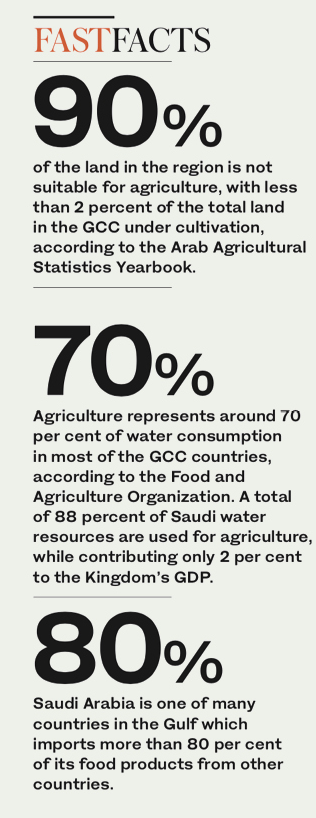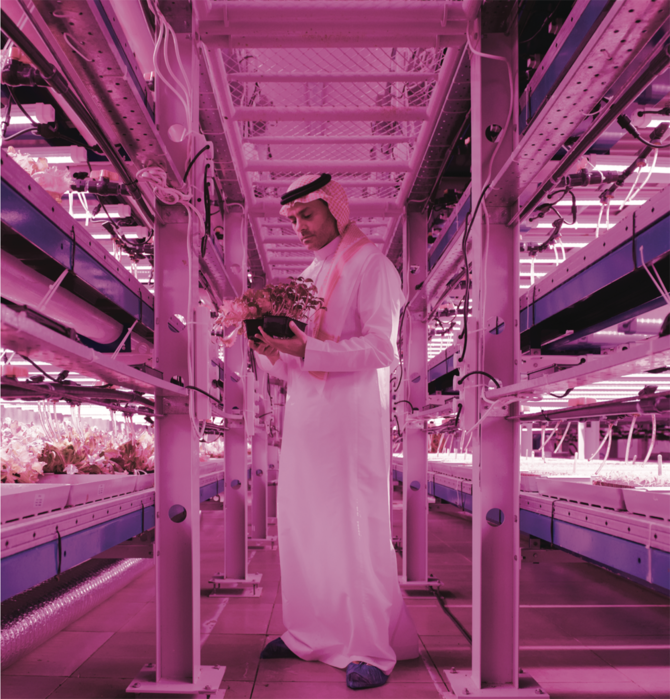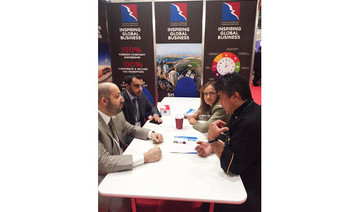DUBAI: Omar Al-Jundi is not your average Saudi Arabian farmer. In fact, he is not even related to farming by degree. But that is exactly where the industrial engineer found his calling, when he built the region’s first vertical farm in the heart of Dubai.
Born in Egypt to Saudi parents, Al-Jundi spent his early years in Alkhobar due to his father’s engineering firm.
The family moved to Jeddah when he was 12 years old. His last two years of schooling were spent at Bahrain School in Manama. “I wanted to graduate with an American high school diploma,” Al-Jundi said. “At the time, as a Saudi, you couldn’t attend private foreign schools.”
Upon graduation, he left the region to study industrial engineering, followed by an MBA at the University of Miami in Florida. Although his father is an engineer and his mother an architect, Al Jundi delved into the world of banking for two and a half years when he moved back to Jeddah upon graduating.
“I then shifted to the hospitality industry, opened the first lounge in Jeddah along with other restaurants with my friends, and ended up selling my share and joining my father’s company,” he said. “You learn that you’re better off doing something on your own than having partners because you end up changing directions.”
After 10 years of “paying his dues” in the family business, he felt compelled to change directions. “As an Arab, you’re always closely tied to the family,” he said. “We’re blessed my father started a business and there’s a place for us in that business, but luckily, my younger brother was a lot more interested in it — I always felt my calling was somewhere else.”
In search of his true passion, he started his journey as an entrepreneur. The field he specialized in had yet to be determined. “I felt that there was a meaning for something else,” Al-Jundi said. “I was free and my family was very supportive.”
Countless research and books later, he became intrigued by the tech space, admitting he believed he would start the next Amazon. “That didn’t follow through,” he said. “Then I thought it would be in mining, but I always looked for something that was away from my comfort zone such as engineering, contracting, real estate and consulting. Just something different. It was a process.”
The young Saudi had reached a point in his life where he felt the need to do something impactful, something which added true value to the region. Eventually, two of his friends introduced him to the concept of modern farming. “I visited some orange farms in Egypt and I was in exploration research mode,” he said. “I enjoyed seeing nature — you’re a lot more relaxed. Here, when you go in and see the plants growing every day, there’s definitely a connection, because you’re seeing the end product, you’re feeling it, and I connect to them.”
The more research he immersed himself in, the more driven his interest became. At the time, the Saudi Government was focused on addressing food security and self-sufficiency. “It’s always been a big topic,” he said. “When you fly out of Riyadh, you find these big circular green spots as they’re trying to green and farm the desert, which was successful, but on the other hand, it depleted our water resources.”
According to the Food and Agriculture Organization, agriculture represents around 70 per cent of water consumption in most of the GCC countries. But Al-Jundi did not give up on the thought.
After moving to Dubai in 2014, he learned about King Abdullah’s Initiative for Saudi Agricultural Investment Abroad. Half the capital needed for agricultural projects was offered to Saudis who invested in a list of 31 countries abroad to purchase land, set up a project and export the food back to the Kingdom. It gave him an idea to start his own vertical farm. “I knew it was a big topic,” he said. “I’d never heard we could grow food with no soil. I thought it was intriguing and fascinating. It was enough for me to know there was something there to explore it further.”
With more than 90 per cent of the region’s land unsuitable for agriculture, Al-Jundi set out to find a solution. He spent the following 12 weeks taking courses in aquaponics, aquaculture, hydroponics and horticulture in California and the Netherlands. He even spent time working in a cucumber greenhouse at the Delphy facility in Holland, where he acquired valuable experience in the field. “It was really professional and a great learning experience,” he said. “That’s when I knew what I wanted to do. And I knew I had to completely immerse myself in it.”
The team of Badia Farms, which he founded in Al Quoz in December last year, consists of 12 people, all of whom have experience in farming. “It took 18 months to get it up and running because we didn’t work with any technical partner,” Al-Jundi said. “I knew I was in it for the long haul, so I worked with different growers and learned.”
The 850-square-meter facility includes a “fertigation” room, which fertilizes and irrigates the 18 varieties of crops he currently grows. Gourmet seeds, some of them hybrids, such as lemon basil, cinnamon kale, wasabi, green radish, mustard, micro kale, edible flowers and cinnamon basil, are flown in from the United Kingdom and the United States every three months — from 50 to 300 kilograms at a time. The farm plans on introducing as many as 26 varieties, including sunflowers.
The seeds are placed on a type of mat made of recycled carpet that is food-certified. LED lights flood the room in a pink atmosphere, with each UV light containing a certain spectrum that is beneficial for the plants.
In the tank room, feed and water is scheduled through a computer based on the crop, with a unique nutrient recipe for each type, including potassium, calcium, magnesium and ammonium. UV and concentrated oxygen are also able to kill any potential bacteria or pathogens in the recycled water.
Once the seeds sprout, they are moved to the five stacks in the vertical farm. Four dehumidifiers regulate the humidity in the air, providing each on average with 70 litres of water a day. The eco-system created by Badia Farms uses 90 per cent less water than open field farming and recycles its water up to nine times.
“We’re using hydroponics,” Al- Jundi said. “The biggest advantage is that we do not spray pesticides, which are messing up our health. In fact, we extensively use stickers to attract insects away from the crops.”
Different levels of lighting are provided for each stage of the plants, before they are sent out as they were grown. “They’re intense in flavor and it’s the freshest you can get that way,” he said. “My personal favourite is chocolate mint.”
With 60 clients so far, serving hotels, restaurants and cafes, the model is a first for the region, which made it challenging to set up. “All the ones abroad are designed for different climatic conditions so none of them are applicable here, where there is extreme humidity and high temperatures,” he said. “And to convince a chef to give you his time, when you don’t have the track record, was a big challenge. I wasn’t a known farmer yet.”
The system’s structure was manufactured in Riyadh, with a plan to set up the next facility by 2020 in Jeddah. Until then, the plan is to cater to Saudi as well as the UAE. “Dubai is a good testing ground and Saudi’s vision now is to support our type of sustainable growing and ecological farms, so it’s perfectly in line with what we want to do,” Al-Jundi said. “The government is now delegated to move into sustainable growing and find viable solutions to address self-sufficiency, so it’s not a slogan anymore: it’s the real deal.”
He hopes to develop similar projects across the Kingdom in the future. “My aim is to make sure we truly become self-sufficient,” he said. “Vertical farming is one solution but it’s not the full one — the ideal solution lies in all models of modern farming. What’s close to my heart is giving people healthy food while preserving our resources, and I believe the new generations of Saudis are ambitious and want to evolve our country. We were just waiting for the opportunity and it has finally come.”
How does his garden grow? Sustainably, in the desert
How does his garden grow? Sustainably, in the desert

- Saudi farmer Omar Al-Jundi has built the region’s first vertical farm in Dubai with plans for Jeddah in 2020
- The team of Badia Farms, which he founded in Al Quoz in December last year, consists of 12 people, all of whom have experience in farming.
Masam project revives hope for displaced families in Hajjah, Yemen

JEDDAH: The humanitarian demining project Masam has helped to revive hopes among displaced Yemenis to return to their homes after large-scale mine clearance operations in Hajjah governorate, officials said on Saturday.
Ousama Al-Gosaibi, head of Saudi Arabia’s Project Masam for Landmine Clearance in Yemen, received Hajjah Governor Maj. Gen. Abdulkarim Al-Sunaini at the project’s headquarters in the Midi district.
During the visit, officials were briefed on the progress and mechanisms of survey and demining operations in the area.
Al-Sunaini expressed appreciation to Saudi Arabia’s leadership for supporting the Masam humanitarian initiative, saying the project had helped save millions of Yemenis and strengthened security and stability in several Yemeni governorates.
He praised Masam’s humanitarian role and its continued efforts to save lives and restore normalcy in liberated districts.
He added that the project’s response had renewed hope among residents seeking to return to homes and farms they were forced to abandon due to landmines and improvised explosive devices planted by the Houthi militia, which triggered a humanitarian crisis.
Al-Gosaibi, meanwhile, welcomed the visit by local authorities and reaffirmed Masam’s commitment to its humanitarian mission.
He said the project would continue working to clear Yemeni territory of landmines to protect civilians, save lives and create a safe environment that allows affected communities to resume normal daily activities without fear.















